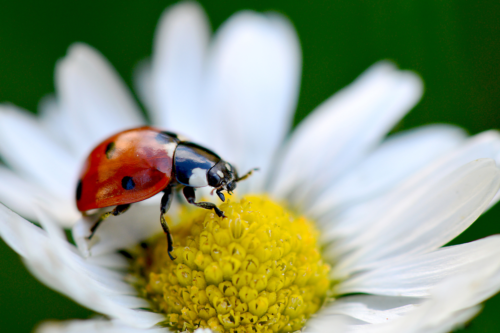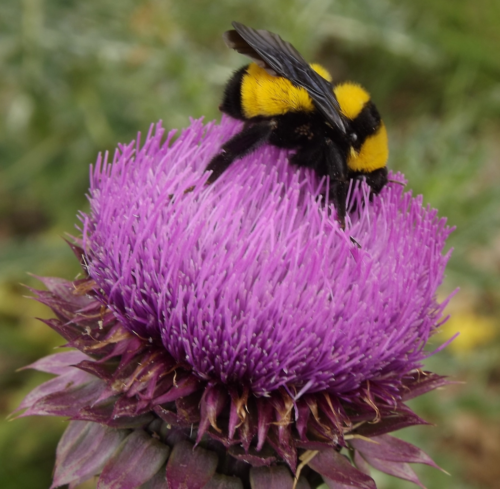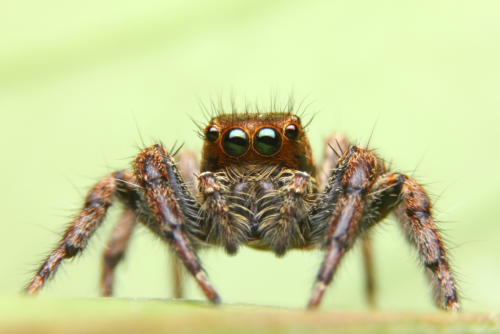Gardeners have plenty to worry about. from plant diseases to ensuring adequate levels of water and sunlight, there are many concerns when it comes to the precious plants and flowers in the garden. While there are countless types of pests that could destroy your roses, tomatoes, or cabbages, there are many garden bugs that are beneficial to keep around. Some of these insects will be crucial controllers of the pests that cause damage, and they will help your garden grow. Consider these insects next time you see something crawling or flying around your beautiful garden, because they may actually be there to help.
Ladybugs (Lady Beetle)
Easy to spot, ladybugs are one of the best beneficial insects and are very popular among children and gardeners alike. As a fierce predator to insect eggs as well as mites and other soft-bodied insects, ladybugs are successful at preventing pest outbreaks. Killing over 5,000 aphids in their lifetime, ladybugs are backyard garden champions.
Beneficial Nematode
Nematodes are not technically bugs, but that does not mean that they will not do their part to protect your garden. Using biological control methods, nematodes are essential at preventing soil-borne pests. You do not have to worry about beneficial nematodes killing the types of insects that are necessary for plant health, as they target bugs like fleas and borers while leaving ladybugs and earthworms alone. Ultimately, beneficial nematodes are crucial components of a successful garden — the soil dwelling microscopic parasites hunt, penetrate, then destroy over two hundred different pest insects.
Beetles
These common garden visitors are good at managing populations of many garden annoyances. Both adult beetles and their larvae feed on detrimental insects such as mites, aphids, thrips, and mealybugs. They are capable of controlling these populations due to their ability to climb up plant stems to find insect eggs to eat.
Assassin Bugs
Given that these insects use tricks and disguises in order to trap, and ultimately kill, their prey, their name is fitting. Interestingly, these insects are also known as kissing bugs because, when they rarely attack humans, they tend to bite close to the lips. When it comes to bothersome garden inhabitants, however, insects like caterpillars and beetles will not get away with just a bite on the lips.
Bees
While many people do not fully understand their importance and try often to get rid of them, bees are actually outstanding pollinators and are essential for a healthy garden. It is estimated that more than a third of what is grown in a garden is directly dependent on pollination by bees. Not only are bees helpful to have around for pollination, but they are also one of the cutest insects and many people appreciate their peaceful humming and vibrant yellow color.
Mealybug Destroyer
As the name suggests, these insects are critical in getting rid of mealybugs. With origins in Australia, these insects were brought to the United States to act as a biological control to prevent outbreaks of the citrus mealybug. Mealybug destroyers are small beetles, and both adults and their larvae are effective predators of aphids and other soft scale insects.
Praying Mantids
These large insects are surprisingly good at hiding. By using camouflage and their greenish color, praying mantids are able to blend in with plants and surprise other large insects before catching and killing them. Aside from successfully controlling caterpillar populations, praying mantids, unfortunately, also eat their relatives.
Pirate Bugs
Pirate bugs are so miniscule, at only 1/16th of an inch, that you may have some in your garden and don’t even know it. Do not let their size fool you. While tiny, these bugs are mighty. Soft-bodied pests like spider mites, caterpillars, aphids, and thrips know to steer clear from pirate bugs. Both the adults and nymphs pierce their prey with their beak before sucking out the unfortunate victim’s vital fluids.
Parasitic or Hunting Wasps
These microscopic wasps are beneficial components of a garden due to their ability to consume eggs and therefore prevent future pest outbreaks. They are so small that you are not able to see them with the naked eye, but like bees, they are likely to be around if you have pollen and nectar plants.
Spiders
Instead of screaming and smashing the next time you see a spider in your garden, remind yourself that spiders are one of the most beneficial predators. With their size and ability to eat a variety of insects, they are important in preventing pest outbreaks.
Big Eyed Bugs
These bugs are easy to spot thanks to their massive eyes that appear to be bulging in contrast with their relatively small bodies. Even though they can actually be smaller than some of their prey, these bugs consume plenty of garden pests like chinch bugs, flea beetles, caterpillars, mites, thrips, loopers, whiteflies, aphids, and earworms.
Fly Parasites
These small, beneficial insects are harmless to animals but very successful at killing filth flies. The female fly parasite is able to prevent future outbreaks by inserting eggs inside of the pupae, which then hatch and consume the rest of the pest fly. Fly parasites need this process in order to reproduce which means that they are determined to find the pests and will not bother gardeners or animals in the process.
Conclusion
When it comes to garden pests not all of them are bad. As you can see these ones help make your garden grow better over time. Have you seen any of these in your garden?
Lynton Paddick specialises in pest control and bought into the Jim’s Pest Control franchise. He works on providing premium pest control services for clients and is a well trusted member of the community. Outside of work he walks the family dogs, goes for bike rides with the family, and enjoys life.





